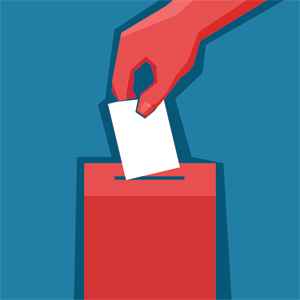California supreme court approves advisory ballot measure questioning Citizens United decision

Image from Shutterstock.
The Supreme Court of California on Monday said that the state lawmakers can place a “nonbinding advisory question” on the ballot which asks voters whether they might want an amendment to the U.S. Constitution that would overturn the 2010 Citizens United v. Federal Election Commission decision, the Los Angeles Times reports. Citizens United opened floodgates for unlimited spending in federal elections by corporations and unions.
The 6-1 decision (PDF) ruled against the plaintiffs in Howard Jarvis Taxpayers Association v. Padilla, who had sought to stop the advisory measure from being placed on the ballot. The decision was narrowly tailored to target Citizens United, but many believe it will prove to be a useful and possibly much-used political tool in the future.
“The reason this is going on the ballot is not because the legislature needs advice, but as a way of getting Democrats and others excited,” says Richard L. Hasen, an election law expert and professor at the University of California, Irvine School of Law, in an interview with the Los Angeles Times. “Citizens United was a polarizing opinion, and it is very unpopular.”
California’s high court reasoned that such a ballot measure would fall within the purview of the legislature.
“Legislators may solicit and consider the views of the people on fundamental matters pertaining to federal constitutional amendments,” Justice Kathryn Mickle Werdegar wrote for the majority.
A concurring opinion by Chief Justice Tani Cantil-Sakauye would have opened the door wider than just for a ballot measure concerning Citizens United: “Nothing in today’s decision should be viewed as calling into question the validity of all types of statewide and local advisory ballot measures, even those completely unrelated to any proposed amendment to the federal constitution,” she wrote.
In his lone dissent, Justice Ming W. Chin wrote: “The specified circumstances in which the legislature has recourse to the ballot exist solely to implement the people’s right to accept or reject what the legislature is proposing. But the legislature does not otherwise need the ballot. It can act itself. Other than in the constitutionally prescribed circumstances, the legislature should not be permitted to hijack the ballot to serve its own agenda.”
The same ballot measure passed the legislature in 2014 and was signed by Democratic Gov. Jerry Brown, but the state supreme court, hearing the appeal of a challenge by the Howard Jarvis Taxpayers Association, blocked it by ruling that the court needed more time to consider the issue, the Sacramento Bee reported at the time. Chief Justice Cantil-Sakauye was the lone dissenter in the 2014 decision.
“Trying to manipulate the ballot for politics is not new,” Professor Hasen told the Times on Monday. “This just gives the legislature another tool to do that.”
U.S. Rep. Ted Lieu, D-Torrance, sponsored the bill earlier when he was in the state legislature and told the Times he believes it will be on the ballot in November, whether put there by the secretary of state or by way of new legislation. “I don’t see any reason for it not to pass again,” he says.
The lawyer for the Howard Jarvis Taxpayers Association, Thomas W. Hiltachk, says it likely will require new legislation to place the measure on the November 2016 ballot. He pledged that if the high court’s decision encourages the legislature to push more advisory measures, “we will take them on again.”



